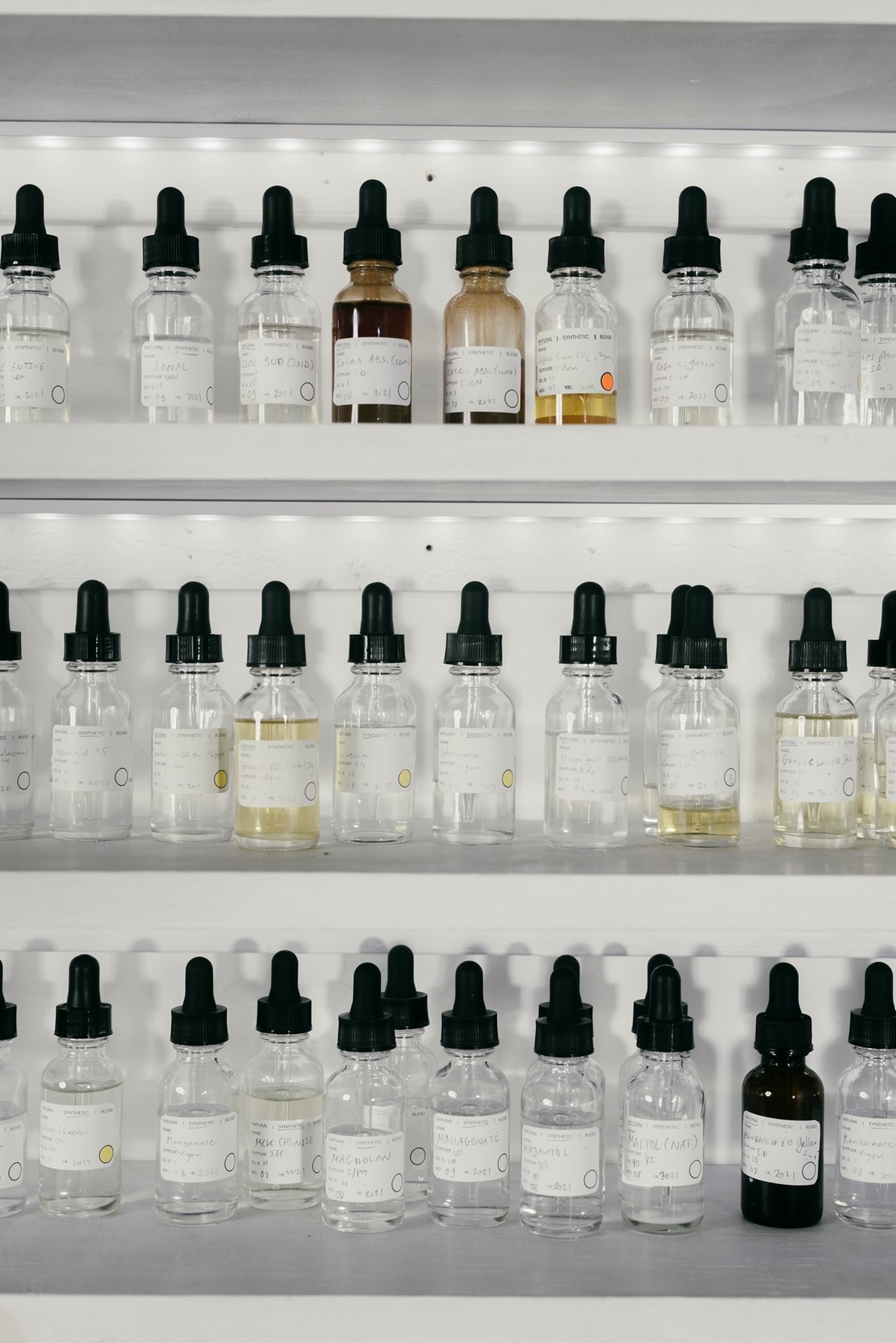On a recent evening, masked students sat
around stainless-steel tables in the scent lab at the
Institute for Art and Olfaction (IAO) in Los Angeles’ Chinatown, pipettes at the ready. The LED glow
from shelves that hold nearly 400 bottles of perfumers’ materials cast a
backlit-bar vibe over the first in-person studio class since the latest
COVID-19 spike. An aromatic cocktail of norlimbanol, vanillin, and myrrh
suffused the atmosphere, permeating even a KF94.
اضافة اعلان
Saskia Wilson-Brown, the instructor, passed around
paper scent strips that had been dipped into a solution of perfumers’ alcohol
and a synthetic version of sandalwood. Masks were gently peeled away for
careful sniffing. General impressions were: “Woody.” “Creamy.” “I smell Tootsie
Roll!”
Wilson-Brown, who founded the nonprofit
organization, said: “These molecules, like us, contain multitudes.”
The institute is in a bodega-size storefront among
the revolving art galleries and curio importers on lantern-strung Chung King
Road. Though the setting is very DIY — a chockablock classroom, gallery, lab,
and library — it’s a headquarters for olfactive experimentation and offers
access to hands-on education, much of which was traditionally available only to
professional perfumers.
But that setting befits the disrupter ethos of
Wilson-Brown, 43, a Cuban and British American artist who grew in California
and Paris. She formerly worked at Current TV, the liberal network founded by Al
Gore and others, and one of her core values at the institute is to democratize
scent.
“We’re not solving the world’s problems here, but
it’s rooted in this idea of fixing injustice,” said Wilson-Brown, who is also a
doctoral candidate at
University College Dublin’s SMARTlab, studying power,
access, and perfume. “The balance of power is off in perfume, and it’s off in
the world. Tweak one space, and maybe that’s a model for tweaking another.”
This September is the institute’s 10th anniversary,
and a month-long celebration is planned: workshops, lectures, exhibits, and
other scent-related events, including a dance performance by the collective
Volta, which may be loosely inspired by the top, middle, and base notes of
perfume structure.
 Inside the Institute for Art and Olfaction in Los Angeles, on February 24, 2022.
Inside the Institute for Art and Olfaction in Los Angeles, on February 24, 2022.
“My favorite thing about the institute is, who’s
going to walk through those doors?” Wilson-Brown said. “It’s going to be some
poet guy, a Beverly Hills lady. Everyone has an interest in scent for some
reason.”
The power of smell
One of the resonant ripple
effects of
COVID-19, an illness whose symptoms include anosmia (the partial or
full loss of smell), may be a deeper appreciation for the olfactory neurons
that are connected to our brains.
Humans have 400 types of scent receptors. We can
distinguish between molecules that are different by a single carbon atom.
Yet “there’s been this philosophical idea that scent
is a primitive sense, and that’s been systematically dismantled as well in the
last couple of years,” Wilson-Brown said. “When we found out the coronavirus
affected smell, it became a big conversation for people, which is interesting
because I also thought COVID-19 was for sure the thing that would put us
under.”
Instead, the institute flourished. Demand and
virtual capacity soared for Zoom lectures and studio courses (for which students
bought scent materials in advance). People joined from all over the world,
across all time zones, to connect to their senses, said Ashley Kessler, a
perfumer and the IAO’s director of education. “All this grounding
life-affirmingness that just sitting and smelling can bring to you — it was
fundamentally like therapy for all of us.”
Adding to ways of thinking about intelligence through the body, scent plays a key role, much more than we realize.
The IAO has accomplished something extraordinary,
said Andreas Keller, 49, who opened Olfactory Art Keller, a commercial gallery
dedicated to contemporary aromatic art, last year in lower Manhattan. “Saskia
brought together a community, and she has done so beautifully. If it hadn’t
been for COVID, this might have remained very local. It has an international
presence.”
Today, the IAO offers an increasing mix of digital
and in-person classes; shares an open-source fragrance database (which includes
formulas, material resources, and even an exhaustive list of scratch-and-sniff
books); fosters partnerships with other cultural institutions, like the Hammer
and J. Paul Getty museums in Los Angeles; and produces a podcast, an
experimental scent summit, and an annual awards ceremony, considered the Oscars
of independent perfumery. It has also helped inspire experiential dinners with
fragrance pairings, scented zines, and synesthetic musical scores in
Los Angeles and beyond.
“Adding to ways of thinking about intelligence
through the body, scent plays a key role, much more than we realize,” Anicka
Yi, an artist known for exploring aromas to orient our view of the world, wrote
in an email. Her recent exhibit in
London filled the Tate Modern’s Turbine Hall
with floating mechanical aerobes and a “scentscape” representing the history of
London’s Bankside area from the 14th to 20th centuries. “The IAO is
contributing to the discourse by bringing the experience of smell through
philosophers, artists, chemists, anthropologists.”
By chipping away at barriers, the institute is
helping reshape the practice of perfumery, often characterized by elitism and a
Eurocentric perspective. To encourage outsider scent culture, Wilson-Brown’s
definition of perfume is intentionally loose, as in not constricted to what one
buys in a bottle. It’s “a conscious combination of aromatics for a
predetermined result,” she said. “A chef could be in some way a perfumer if she
combines materials for their aroma, or a florist. The advantage of this
definition is that it’s inclusive.”
Having reached the decade milestone — longer than
many for-profit businesses are able to stay afloat — Wilson-Brown is determined
to keep asking questions. “We can talk about how perfume is awesome, then
what?” she said. “What’s the context? How does it impact society? How does it
impact relationships?”
Read more Trending



